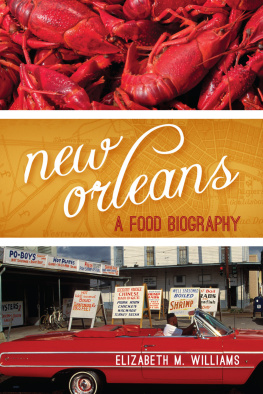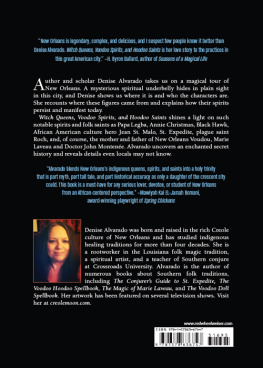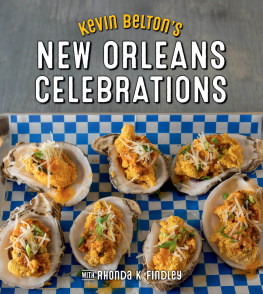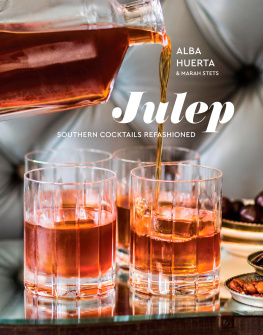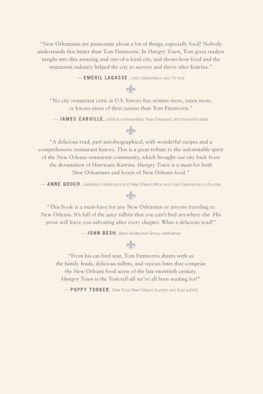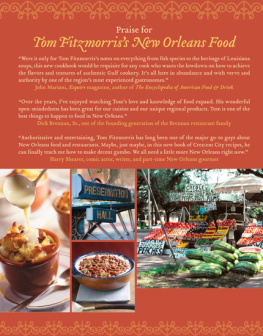Published by Louisiana State University Press
Copyright 2016 by Louisiana State University Press
All rights reserved
Manufactured in the United States of America
FIRST PRINTING
DESIGNER: Barbara Neely Bourgoyne
TYPEFACE: Sina Nova
PRINTER AND BINDER: Maple Press
LIBRARY OF CONGRESS CATALOGING-IN-PUBLICATION DATA
Names: Williams, Elizabeth M. (Elizabeth Marie), 1950 author. | McMillian, Chris, 1961 author.
Title: Lift your spirits : a celebratory history of cocktail culture in New Orleans / Elizabeth M. Williams and Chris McMillian ; foreword by Dale DeGroff.
Description: Baton Rouge : Louisiana State University Press, [2016] | Series: The Southern table | Includes bibliographical references and index.
Identifiers: LCCN 2015042803 | ISBN 978-0-8071-6326-9 (cloth : alk. paper) | ISBN 978-0-8071-6327-6 (pdf) | ISBN 978-0-8071-6328-3 (epub) | ISBN 978-0-8071-6329-0 (mobi)
Subjects: LCSH: Drinking of alcoholic beveragesLouisianaNew OrleansHistory. | CocktailsLouisianaNew OrleansHistory. | ProhibitionLouisianaNew OrleansHistory.
Classification: LCC GT2883.U6 W55 2016 | DDC 394.1/30976335dc23 LC record available at http://lccn.loc.gov/2015042803
The paper in this book meets the guidelines for permanence and durability of the Committee on Production Guidelines for Book Longevity of the Council on Library Resources.

FOREWORD
No matter where it went, the Museum of the American Cocktail stayed connected to New Orleans. Why New Orleans?... MOTAC belonged in New Orleans because New Orleans was the place that nurtured the cocktail. The city was the keeper of the cocktail flame.
from this books last chapter
W e opened the Museum of the American Cocktail in New Orleans in 2005, and that first year we began marking certain days as important in the calendar of cocktail culture: May 13, 1806, the day that cocktail was first defined in print; and December 5, 1933, the day Prohibition was repealed. We celebrated those days at the museum, and we encouraged bars and bartenders around the country to join us in that celebration.
Among the founders of the museum were Chris McMillian and his wife, Laura. Chris was already a scholar of the New Orleans drinks culture and the celebrated barman at the Library Lounge in the Ritz-Carlton. Chris adopted New Orleans as home for himself and his family in 1984, but it was a homecoming. Chris was made for New Orleans, and he has enriched and added to the drinks culture; he is timeless but timely, a storyteller and an oral historian. In Lift Your Spirits, we are his and Elizabeth Williamss captive but willing audience.
By Repeal Day 1933, the fine craft of cocktail bartending as a profession had all but disappeared, and criminal organizations had a firm grasp on the sale of alcoholic beverages. In 1932, Franklin D. Roosevelt rode to the White House on the repeal ticket, but to actually amend the Constitution required a series of delicate maneuvers that Roosevelt and a group of industry leaders skillfully executed to reverse the Nineteenth Amendment.
The compromises Roosevelt made specifically with states rights advocates turned over the control and sale of alcoholic beverages to the states and even local counties, resulting in a byzantine maze of blue laws that confounded legitimate purveyors of spirits from state to statebut not in New Orleans. In New Orleans, the drinks culture was integrated tightly into the fabric of daily life, and Prohibition was greeted with an almost comical shrug.
Throughout the United States, except in New Orleans, the rich culture of drink that had developed over more than two centuries unraveled during the 13-year-long social experiment. After Prohibition ended, desperate economic times and another world war stalled the revival of the fine spirits industry. Many fine spirits brands that contributed to a rich palette of flavors did not survive the decade-plus drought.
The bottom of the barrel was hit during peacetime in the fifties, when the drinks industry suffered the ultimate insult, shortcuts to make up for a lack of skilled labor. There was no serious training available for this gangster trade, so bar and restaurant owners turned to presweetened, artificially flavored mixes in an attempt to offer a consistent product. They succeeded; they achieved a consistently mediocre producteven in some bars in New Orleansbut not in all.
On the culinary side of the business, pre-prepared, canned, and processed food products developed during the world wars were embraced by the commercial food industry. Designed to make life easier, these products flooded the market; TV dinners, baby formula, Kool-Aid, Jiffy Pop, and Tang were the rage. Americans all over the country happily abandoned the fresh and natural, scooping up all that was processed and cannedbut not so much in New Orleans.
New Orleanians were never in danger of losing their culture of food and drink. It is the foundation of their way of life. In Lift Your Spirits, Williams and McMillian reveal a city that absorbed without destroying cultures: Spanish, French, and American. The cuisines that are celebrated in the diners and pubs, neighborhood groceries, and signature restaurant destinations are the first fusion cuisines in America. The iconic dishes with tradition never disappeared, and the drinks that have defined New Orleans for over 120 years are still the cornerstone of the drink culture.
My first experience of New Orleans occurred in 1978. My girlfriend and I were on a road trip from New York to California when we wandered into the Old Absinthe House just as the bigger-than-life character behind the bar was shouting sazzerrraaac and tossing a glass in the air. We felt a fine mist on our faces and smelled a slight aroma of anise or licorice or both. When we finally fell under her gaze, we ordered Sazeracs. There were thousands and thousands of business cards stapled to the wall, and at the corners of the bar, tall stone and brass fountains sat unused, relics of an earlier time. We were strangers in a strange land and stayed two days beyond our planned stopover.
In the years to come, I ordered Sazeracs at Tujagues on Decatur, Jacques-Imos uptown, the Carousel Bar at the Monteleone. I ordered them with one lump instead of twoI like them on the dry sideand in each of these places I found surroundings of substance. They were worlds unto themselves with their regulars and streams of guests from around the globe, all drawn to New Orleans by the promise of hospitality and of a bit of the naughtiness that New Orleans culture celebrates.


